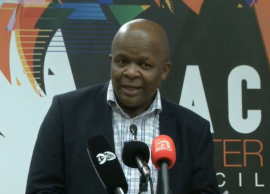
In an effort to match the success of other countries in redressing economic imbalances in a digital and multiplatform environment, government has launched the Marketing, Advertising and Communications SA (MAC SA) Charter Sector Council.
“Therefore, South Africa through the MAC Charter Council must focus all its attention on economic growth and the key problems affecting the South African economy,” Minister in the Presidency, Mondli Gungubele, said on Friday.
Addressing the launch of the council in Pretoria, the Minister said the council has been tasked with broadening the meaningful participation of blacks, women, youth and people with disabilities in the sector - not just as consumers but also as entrepreneurs.
The council will monitor transformation of the sector by facilitating the implementation of the Broad-Based Black Economic Empowerment (B-BBEE) sector code.
“Although we have made great strides since the advent of our democratic dispensation, we still do see sexism, racism and other offences of the Constitution rearing their head from time to time in ways that set back the way South Africans feel about themselves and the way in which we relate to one another as citizens of this country,” the Minister said.
The Council is tasked with building progressive partnerships that will unleash the creative abilities of professionals and technically skilled people in this sector and change the sector and society for the better.
“This is the transformation agenda for the MAC sector – alongside its potential to contribute to the investment drive led by the President [Cyril Ramaphosa] with a target of R1,2 trillion in domestic and international investment in a five-year period that began in 2018,” Gungubele said.
The council has representatives from academia, the regulator, marketers, women, youth, and people with disability, public relations institutes, organised labour, outdoor media, industry associations and interactive marketers.
“It functions independently and the annual transformation report it produces is processed through the Government Communication and Information System (GCIS).
Review of the 2016 MAC sector code
“One of the first duties of the council is to review and align the 2016 MAC sector code based on the new requirements issued by the Department of Trade, Industry and Competition (the dtic) in 2019.
“I want the council to complete this by no later than January 2023, which is the fourth quarter of the next financial year, starting in April,” the Minister said.
The revised code will ensure that the sector can be measured with yardsticks that apply to MAC, instead of the generic code.
“The advantage of [a] sector specific code is that it brings regulatory certainty and enables the sector to maximise its transformative impact by focusing on opening up participation in the sector for designated groups that include women, youth and people with disabilities,” he said.
The Minister said gazetting of the code will be a monument to the sterling work that the council is expected to do as it contributes in making the future work.
“We expect young South Africans – who are worst affected by unemployment - to benefit from the Enterprise and Supplier Development element of this Code. South Africa does not have a shortage of young entrepreneurs who are pursuing their dreams by establishing MAC businesses.
“Young people in all provinces need a hand up and it is for this reason that this Council includes four young people with suitable qualifications who will serve as alternative members,” Gungubele said.
The Minister said composition of the council speaks to the goal of inclusivity and transformation. –SAnews.gov.za


